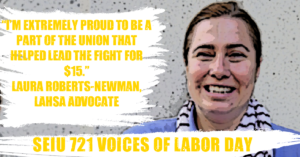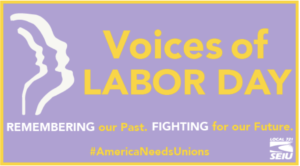By Laura Roberts-Newman
Perhaps I was in a serious state of denial but even after two nights of sleeping in a hedge on Sunset Blvd. it still hadn’t truly sank in.
When a man came up to me holding out a piece of paper and saying, “Here’s a list of places that help homeless people,” I nearly turned around to see who he was talking to.
But I was the only one there. He was talking to ME.
I. Was. HOMELESS.
How could I, a middle-class white woman from London whose mother was a well-known social worker and lecturer, be living on the streets of Los Angeles?
Without a job paying livable wages, it was frighteningly easy.
So easy that in just the last year, the LA County homeless count showed there were 11,000 more homeless people in the county than in 2016. That’s a 23 percent jump, bringing our county’s total number of homeless to 58,790. Easy.
But that’s what happens when rents keep rising, housing is scarce, and too many jobs don’t pay enough.
My bout with homelessness happened in 2010 and I’m grateful that I’ve come full circle, helping others escape the streets as an advocate at the Los Angeles Homeless Services Authority (LAHSA). I’m thankful to say I don’t just have a job, I have a union job.
That’s why this Labor Day is special for me. It embodies the hope I now have after my co-workers at LAHSA and I were successful in our fight to join the Service Employees International Union Local 721.
We’re part of a union that led the Fight for $15 campaign to raise California’s minimum wage. Today I have a voice on the job to negotiate wages that helps keep the possibility of me popping up my own tent on LA’s streets as far away as possible. Sadly, too many others can’t say the same.

I could have easily been one of the people in LA Times columnist Steve Lopez’ June 4 piece about high rents and homelessness in LA. As he pointed out, the median per capita income in L.A. County is less than $30,000 for individuals and about $55,000 for households. The median rent for a one-bedroom apartment in LA County is $1,995, and research by the National Low Income Housing Coalition shows that California workers need to earn at least $30.92/hour to afford a modest 2-bedroom apartment! So yeah, with hurdles like that it’s easy to see how a person’s safety net can quickly disintegrate like mine did.
Growing up I’d dreamed of becoming an actress and had studied theater so I moved to Los Angeles in 2002 after my mother died from cervical cancer. I got a job working at a call center doing fundraising for a non-profit and was making $10/hour. It wasn’t much but I survived by renting a room from a friend, one of only a handful of people I knew here.
Then suddenly my friend passed away. Unable to afford a place on my own, I was homeless in a matter of weeks.
Again, it was terribly easy.
Without the basic amenities of a roof over my head, I quickly lost my job. I managed to get to a halfway house and the organizers there said they’d take me to a shelter that could help me. What they didn’t say was that shelter was on Skid Row.
No matter how bad you imagine Skid Row to be, I can assure you it’s a million times worse. My first night there was the most terrified I’ve ever been in my life.
Seeing the degree of suffering was like being in a horror movie. It was like tasting death.
There’s a feeling of being in quicksand because you can sense you’re surrounded by people who are literally hopeless and you know it’s only a matter of time until that hopelessness drags you under too.
I spent a year living on Skid Row. One day a preacher came to the Union Mission Shelter and quoted the Bible verse of “rise, take up your bed and walk.” Those words were like an epiphany to me. They gave me the strength to keep trying and I eventually got into a program that helped me find housing. Now my husband of six years and I live in a nice, small apartment that’s just one train stop away from my work downtown.
For those of us who are fortunate enough to not be hovering on the edge of homelessness, it can be tempting to say those who are struggling should “just get a job.” But a mere “job” doesn’t mean much in a city as expensive as LA unless they pay livable wages. My $10/hour job sure wasn’t enough and it just took one thing, my friend’s death, to push me onto the street.
That’s what we must all aim to honor this Labor Day, not just through nostalgia for a workers’ movement of days gone by; but rather through solidarity with workers of today. Yes, the eight-hour workday, and the establishment of child labor laws and the weekend are great, but today, workers like myself need workers like you to stand with us in solidarity.
Our city of Angels, and the angels who dwell in it, will move beyond makeshift tent cities when each of us commits to supporting, demanding, and fighting for the union jobs that gave all us a Labor Day to celebrate in the first place.
Laura Roberts-Newman is a member of SEIU 721 and is an Advocate at the Los Angeles Homeless Services Authority (LAHSA) where she works to help get her clients into housing.
Related Video:
___
In tomorrow’s “Voices of Labor Day” entry, SEIU 721 member Bob May shares about his 23 years of experience as a Maintenance Worker for Ventura County and how pensions represent a lifetime of hard work.
 Share
Share
 Share
Share

